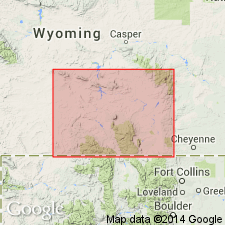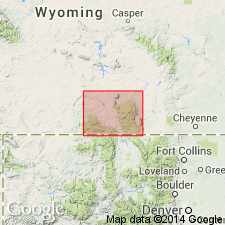
- Usage in publication:
-
- Gaps Granite
- Modifications:
-
- Named
- Dominant lithology:
-
- Granite
- AAPG geologic province:
-
- Northern Rocky Mountain region
Summary:
Named for [North and South] Gaps Lakes, secs 5 and 8, T16N, R79W, Albany Co, WY in the Northern Rocky Mountain region. Occurs in two small bodies of felsic igneous rock along faults--one in sec 8, T16N, R79W, and another in sec 17, T15N, R80W in adjoining Carbon Co north of the Mullen Creek-Nash Fork Shear Zone. No type locality designated. Cuts lower part of Libby Creek Group. Is in contact with Medicine Peak Quartzite on the east side and Lookout Schist on the west. Contacts with quartzite and schist are cross-cutting. Contains abundant misoriented inclusions of quartzite along its borders. Has been sheared after emplacement. Misoriented pieces of granite present along zones of cataclasis. Geologic map. All samples studied were highly altered. Quartz, plagioclase, muscovite (about 15 percent), and perhaps some seriticized K-feldspar present. Accessory minerals are apatite and opaque minerals. Precambrian age.
Source: GNU records (USGS DDS-6; Denver GNULEX).

- Usage in publication:
-
- Gaps Intrusion*
- Modifications:
-
- Redescribed
- Geochronologic dating
- Dominant lithology:
-
- Quartz diorite
- AAPG geologic province:
-
- Northern Rocky Mountain region
Summary:
Name changed from Gaps Granite to Gaps Intrusion because the intrusion lacks potassium feldspar and is too low in silica for granite. The Gaps is the only felsic intrusive rock to cut the Early Proterozoic succession. The occurrences located in S1/2 sec 8, T16N, R79W and in sec 17, T15N, R80W north of Lewis Lake, Albany Co, WY, Northern Rocky Mountain region, are designated the type locality. Composition variable; most of the rocks are leucocratic, sodic, quartz diorite with oligoclase or albite and no potassium feldspar. Consists primarily of plagioclase with lesser and variable amounts of quartz, muscovite, and opaque minerals. Accessory minerals are biotite, epidote, carbonate, and chlorite. Mineralogy suggests metamorphic alterations of quartz dioritic, dioritic, or gabbroic rocks. Micas define well-developed foliation. Related to mafic dikes in area. Intrusions in Medicine Bow Mountains located along major fault zones. Cuts Lookout Schist and Sugarloaf Quartzite of Libby Creek Group in the Medicine Bow Mountains. Cuts Copperton Formation in sec 31, T14N, R86W and in sec 20, T14N, R84W in the Sierra Madre. Located along major fault zones. Is highly sheared and fractured. Age of 1,900 to 2,150 Ma on initial 87/Sr 86/Sr ratio, or Early Proterozoic. Geologic map; stratigraphic charts.
Source: GNU records (USGS DDS-6; Denver GNULEX).
For more information, please contact Nancy Stamm, Geologic Names Committee Secretary.
Asterisk (*) indicates published by U.S. Geological Survey authors.
"No current usage" (†) implies that a name has been abandoned or has fallen into disuse. Former usage and, if known, replacement name given in parentheses ( ).
Slash (/) indicates name conflicts with nomenclatural guidelines (CSN, 1933; ACSN, 1961, 1970; NACSN, 1983, 2005, 2021). May be explained within brackets ([ ]).

